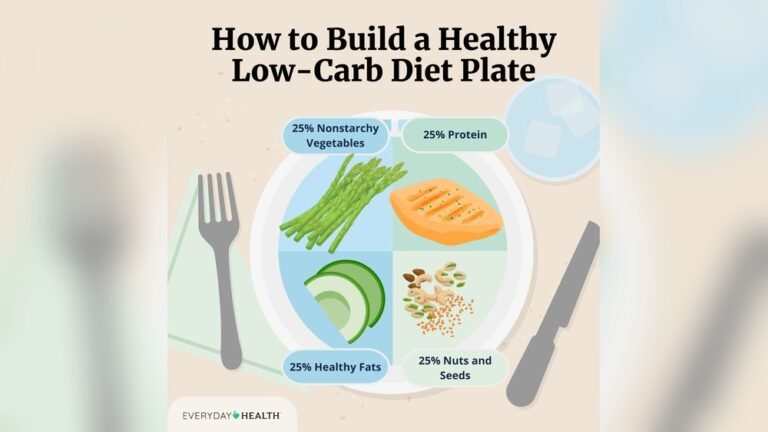Are you curious if eating low carb is truly good for your health? You’ve probably heard that cutting carbs can help you lose weight and control your blood sugar, but is it safe and effective in the long run?
Understanding how low-carb eating affects your body can make all the difference in reaching your health goals without unwanted side effects. You’ll discover what really happens when you reduce carbs, the benefits you might enjoy, the risks to watch out for, and how to make low-carb work for you in a healthy, balanced way.
Keep reading to learn how to take control of your diet with confidence.

Credit: www.maebells.com
Low Carb Diet Basics
A low carb diet limits carbohydrate intake and focuses on proteins and fats. It changes how your body gets energy. Instead of burning carbs, your body uses fat. This switch can affect weight, blood sugar, and overall health.
Understanding the basics helps you see if low carb suits your lifestyle. It also shows how it impacts your body and mind. Simple knowledge can guide better food choices on this diet.
How Low Carb Works
Carbohydrates are the body’s main energy source. When carbs are low, the body looks for another fuel. It starts breaking down stored fat. This process provides energy instead of carbs.
Reducing carbs lowers blood sugar and insulin levels. This may help with weight loss and blood sugar control. The body adapts by changing its fuel source to fat.
What Is Ketosis
Ketosis is a natural state when fat becomes the main fuel. The liver turns fat into molecules called ketones. These ketones provide energy for the brain and body.
This state happens after a few days of low carb intake. Ketosis can help reduce hunger and boost fat burning. It is a key part of many low carb diets.

Credit: cincinnati-gi.com
Common Myths
Many people have misunderstandings about low carb eating. These myths can cause confusion and fear about trying this way of eating. Let’s clear up some common myths that may stop you from making healthy choices.
Low Carb Means No Energy
Carbohydrates are not the only source of energy for the body. When carbs are low, the body uses fat for fuel. This process is called ketosis. Many people feel steady energy and less hunger on low carb diets. The brain can run well on ketones, which come from fat. So, low carb does not mean no energy.
All Carbs Are Bad
Carbs are not all the same. Some carbs come from sugary, processed foods that cause blood sugar spikes. Other carbs come from vegetables, fruits, and whole grains. These provide fiber, vitamins, and minerals. Good carbs help the body work well and keep you full longer. The key is choosing healthy carbs, not avoiding all carbs.
Low Carb Causes Nutrient Deficiencies
Any diet can cause nutrient gaps if not planned well. Low carb diets focus on lean meats, vegetables, nuts, and healthy fats. These foods provide many nutrients. Missing out on some fruits or grains means you need other sources for fiber and vitamins. Planning meals carefully can prevent deficiencies and keep nutrition balanced.
Health Benefits
Low carb eating offers several health benefits that attract many people. It changes how the body uses energy and affects overall health positively. This section explores key health benefits of a low carb diet.
Weight Loss Effects
Eating fewer carbs helps the body burn stored fat for energy. This process can lead to noticeable weight loss. Without many carbs, insulin levels drop, which helps fat cells release stored fat. Many find it easier to lose weight on a low carb diet than on high carb diets. Weight loss also improves other health markers, making it a popular choice.
Blood Sugar Control
Lowering carb intake helps control blood sugar levels. This is important for people with diabetes or insulin resistance. Fewer carbs mean less sugar enters the bloodstream after meals. This prevents sharp blood sugar spikes and reduces insulin demand. Stable blood sugar supports better energy and reduces diabetes risks.
Heart Health Improvements
Low carb diets can improve some heart health markers. Studies show they often lower triglycerides, a type of fat linked to heart disease. These diets may also raise HDL, the “good” cholesterol that protects the heart. Lowering carbs can reduce blood pressure for some people. These changes may help lower the risk of heart problems over time.
Potential Side Effects
Low carb eating can bring benefits, but it may cause some side effects. These effects vary by person and depend on how strict the diet is. Understanding possible side effects helps you make better choices. Some side effects happen during the first days. Others may appear after longer periods. Being aware keeps you prepared.
Keto Flu Symptoms
Many people feel flu-like symptoms at the start of a low carb diet. This is called the “keto flu.” Common signs are headache, tiredness, dizziness, and irritability. These symptoms happen because the body adjusts to burning fat for energy. The keto flu usually lasts a few days to a week. Drinking water and resting can ease symptoms. Some find adding salt or electrolytes helpful.
Digestive Challenges
Low carb diets often reduce fiber intake. Fiber is important for smooth digestion. Without enough fiber, constipation can occur. Some may also experience bloating or stomach discomfort. Eating non-starchy vegetables can improve digestion. Drinking plenty of water also helps. If problems last, adjusting fiber sources may be needed.
Long-term Health Concerns
The effects of low carb diets over many years are still unclear. Some worry about heart health due to higher fat intake. Others fear nutrient deficiencies from avoiding certain food groups. Gut health may change from lower fiber. Regular check-ups can monitor cholesterol and nutrient levels. Balancing food choices helps reduce these risks. More research is needed to fully understand long-term impacts.
Nutritional Considerations
Choosing a low-carb diet requires attention to more than just cutting carbs. Nutritional balance plays a key role in maintaining health. Understanding important nutrients helps avoid problems and supports overall well-being.
Avoiding Nutrient Gaps
Low-carb eating can reduce intake of some essential nutrients. Vitamins like B and C, along with minerals, may be low. Fruits, whole grains, and legumes often provide these nutrients. Planning meals with diverse low-carb foods helps fill these gaps. Include leafy greens, nuts, seeds, and lean proteins to cover nutrient needs.
Importance Of Fiber
Fiber supports digestion and keeps the gut healthy. Low-carb diets sometimes lack enough fiber because they limit fruits and whole grains. Without fiber, constipation and digestive issues may occur. Non-starchy vegetables, nuts, and seeds offer good fiber sources. Aim to include these foods daily for smooth digestion and better health.
Balancing Electrolytes
Electrolytes like sodium, potassium, and magnesium keep the body’s fluids balanced. Low-carb diets can cause the body to lose electrolytes faster, leading to fatigue or muscle cramps. Eating foods rich in these minerals is important. Avocados, leafy greens, nuts, and broth are excellent choices. Staying hydrated also helps maintain electrolyte balance and energy levels.
Building A Healthy Low Carb Plan
Building a healthy low carb plan starts with smart food choices. It means focusing on nutrient-rich foods that support your body’s needs. A well-structured plan helps avoid common pitfalls like nutrient gaps or unwanted side effects. The goal is to keep the diet balanced, tasty, and sustainable over time.
Choosing Whole Foods
Whole foods are the foundation of a healthy low carb diet. These include fresh meats, fish, eggs, nuts, and seeds. Avoid processed foods, which often contain hidden sugars and unhealthy fats. Whole foods provide more vitamins, minerals, and fiber. They keep you full and energized throughout the day.
Incorporating Healthy Fats
Healthy fats are vital on a low carb plan. Sources like avocados, olive oil, and fatty fish supply essential fatty acids. These fats support brain health and reduce inflammation. Avoid trans fats and limit saturated fats from processed meats. Including good fats helps you feel satisfied and maintains steady energy levels.
Including Non-starchy Vegetables
Non-starchy vegetables are low in carbs but high in nutrients. Examples include spinach, broccoli, cauliflower, and peppers. These veggies add fiber and important antioxidants to your diet. They help digestion and keep blood sugar stable. Filling your plate with colorful vegetables adds variety and flavor to meals.
When To Seek Advice
Knowing when to seek advice during a low carb diet is important. Diets affect people differently. Paying attention to your body helps you stay safe and healthy. Professional guidance supports better choices and long-term success.
Consulting Healthcare Providers
Talk to a doctor before starting a low carb diet. This is crucial if you have health conditions like diabetes or heart disease. A healthcare provider can offer personalized advice. They can help prevent risks and monitor your progress.
Monitoring Your Health
Track your energy levels, mood, and digestion while on a low carb diet. Watch for symptoms like dizziness, fatigue, or digestive problems. Regular check-ups and blood tests help catch issues early. Monitoring ensures your diet supports your overall well-being.
Adjusting Based On Individual Needs
Everyone’s body responds differently to low carb eating. Adjust your carb intake if you feel weak or unwell. Balance your meals with enough fiber, vitamins, and minerals. Seek advice to tailor your diet to your lifestyle and health goals.

Credit: www.skinnytaste.com
Conclusion
Low carb eating can offer benefits like weight loss and better blood sugar control. It may also improve some heart health markers. Short-term side effects such as fatigue or headaches can occur. Nutrient deficiencies may develop without careful food choices.
Choosing whole, nutrient-rich foods helps maintain balance. Drinking enough water and managing electrolytes supports your body. Consulting a healthcare professional before starting is important. This approach suits some but not everyone. Weigh the pros and cons to decide what fits you best.


